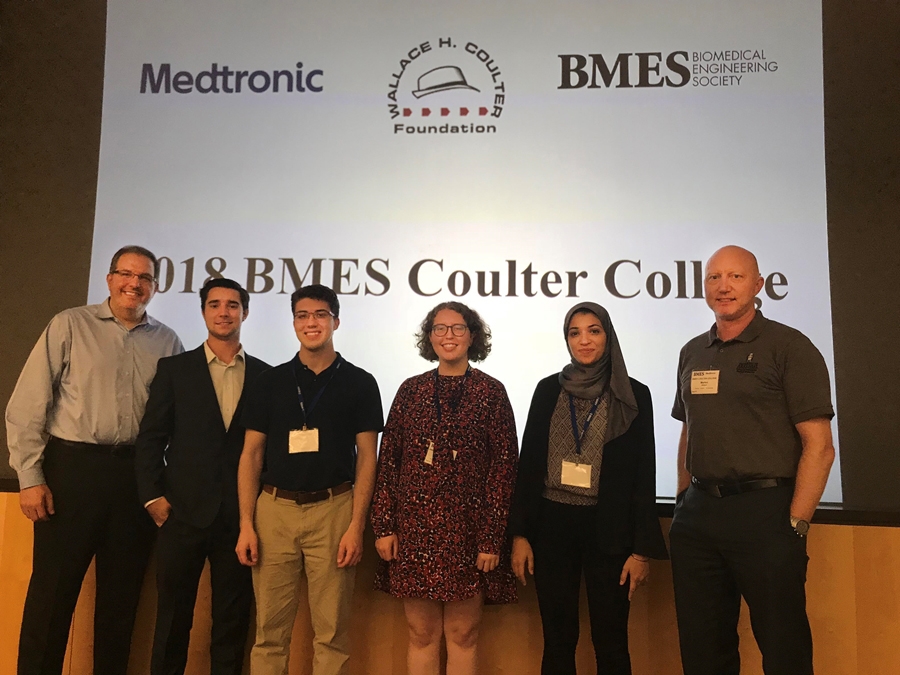
A group of biomedical engineering students recently traveled to Minnesota to train under industry leaders who helped them develop solutions to real-world problems associated with treating stroke, chronic pain and chronic hypertension.
From Aug. 2-5, a University of Arkansas team attended the Biomedical Engineering Society Coulter College training program in Minneapolis, along with 10 other universities across the U.S. and one university from Colombia. The University of Arkansas team consisted of undergraduates Alaa Abdelgawad, Kaylee Henry, Justin Combs, Mason Belue, and Associate Professor Morten Jensen, who teaches Biomedical Engineering Design.
The aim of the annual program is to help students design solutions for unmet clinical needs, and this year the program focused specifically on chronic pain, stroke and chronic hypertension.
The University of Arkansas team attended an orientation at Medtronic's operational headquarters, where they heard keynote lectures from Medtronic leaders and Dr. Gilda A. Barabino, the Daniel and Frances Berg Professor and dean of the Grove School of Engineering at the City College of New York. The team also had an opportunity to tour the device creation and development labs at the headquarters, witnessing the progress of new devices such as portable dialysis machines and interacting with lead development engineers.
For Henry, the experience was a chance to gather ideas aimed at solving health problems in Arkansas.
"After the tours, the program directors explained the focus of this design program, which was to teach us how to use the bio-design process to develop creative solutions to specific needs," she said. "The identified need for the University of Arkansas was to improve management of chronic hypertension in resource-constrained settings.
"Our specific need hit home for the team, since we were able to relate our assigned need with Arkansas' own population and current health disparities." Arkansas, she noted, has the highest death rate from cardiovascular disease in the U.S, the third highest obesity rate in the U.S., and the fourth highest hypertension rate in the U.S.
On their first full day of the program, the team was hosted by Medtronic at their Physiological Research Laboratories. During the next two days, they brainstormed ideas for a hypertension treatment device designed to increase patient adherence to doctors' prescriptions with the assistance of an industrial designer and business mentors.
The group also had the opportunity to tour the interactive Visual Heart Lab on the University of Minnesota campus, ultimately gathering at the Physiological Research Laboratory to pitch their business plan for their final device to the program mentors, who acted as de facto venture capitalists.
"With the mentors' positive feedback, our team left the BMES Coulter College program feeling inspired and committed to continue developing our hypertension device, which will now be a senior design project," Belue said. "As a result of this event, we learned how to use the engineering bio-design philosophy to identify a problem, divergently brainstorm needs considering system constraints, convergently develop a needs statement, and critically respond to that needs statement.
We learned about the dangers of immediately suggesting solutions when brainstorming needs because it can limit creative thinking and cloud judgement. We also learned the importance of considering resource constrained areas because it broadens the innovative perspective and inspires empathy."
Raj Rao, professor and head of the department of biomedical engineering, praised Jensen and the students for their work to make the trip a reality.
"I would like to commend the students under the guidance of Dr. Morten Jensen for participating in this Coulter College Training program; and addressing healthcare problems that impact our communities," Rao said. "The support from the Biomedical Engineering Society and the partnership with Medtronic for the first time definitely was invaluable to our students."
Topics
Contacts
Elizabeth DeMeo, media specialist
Biomedical Engineering
479-575-4667,
Nick DeMoss, director of communications
College of Engineering
479-575-5697,